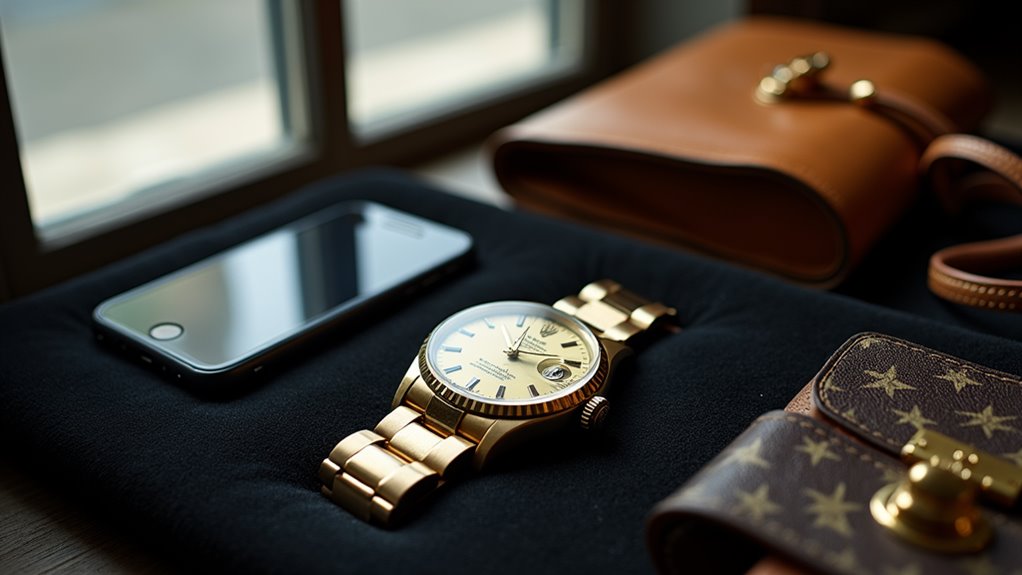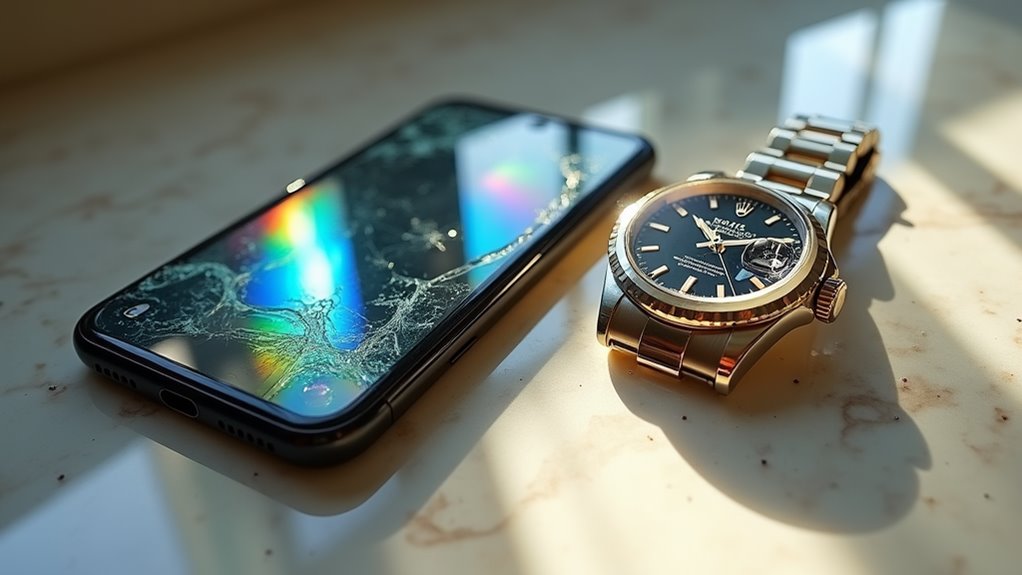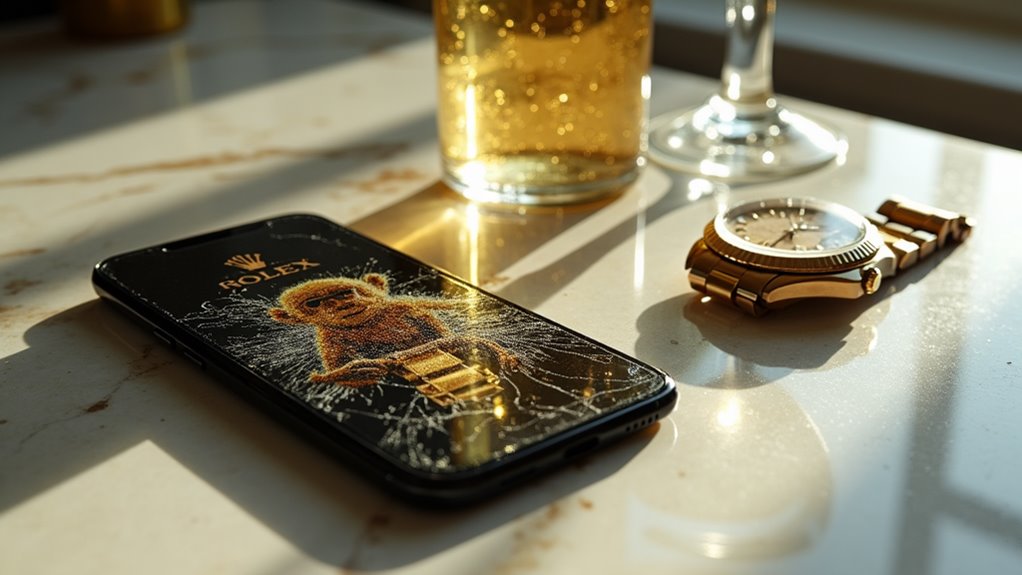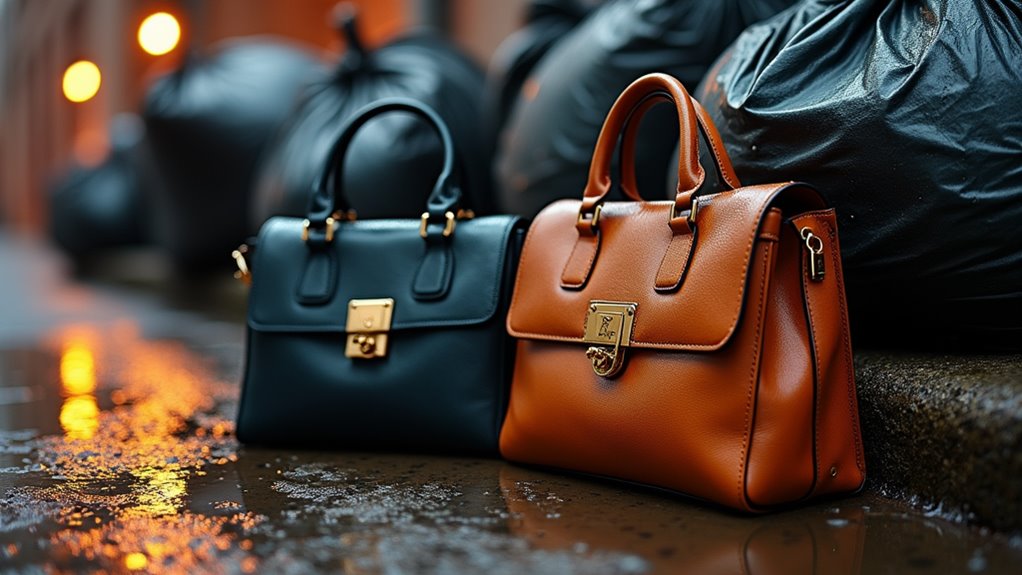Status symbols have evolved far beyond luxury cars and designer watches. While traditional wealth markers still matter, you'll find today's social standing increasingly tied to environmental consciousness, digital influence, and cultural sophistication. Your impact on society, sustainable choices, and authentic connections now carry more weight than pure monetary displays. Social media metrics and virtual assets have created new forms of prestige, especially among younger generations who prioritize experiences over possessions. The psychology behind status-seeking behavior reveals deeper truths about how you navigate social hierarchies and define success in the modern world.
Key Takeaways
- Status symbols have evolved from basic survival markers to digital assets, reflecting changing cultural values and economic conditions.
- Social media metrics and online influence now rival traditional wealth indicators like luxury cars and real estate.
- Environmental consciousness and sustainable choices have become powerful status symbols, particularly among younger generations.
- Status-seeking behavior is driven by psychological needs for social validation and acceptance rather than genuine wealth.
- Authentic experiences and cultural capital often carry more social weight than material possessions in modern status hierarchies.
The Evolution of Status Symbols

Throughout human history, status symbols have transformed from simple markers of survival to complex indicators of wealth, power, and social position. You'll find that early humans displayed their status through basic necessities like food, shelter, and weapons, which demonstrated their ability to survive and protect their families.
As civilizations developed, you've seen status symbols evolve into more sophisticated forms. In ancient times, purple dye, silk, and precious metals became coveted markers of nobility.
During the Industrial Revolution, you'd notice status shifting toward manufactured goods and property ownership.
Today, you're witnessing status symbols becoming increasingly digital and experiential, from social media influence to exclusive memberships.
What's fascinating is how they've moved beyond material possessions to include knowledge, influence, and access to unique experiences.
Traditional Markers of Wealth
You'll find that traditional luxury goods like high-end cars and designer watches remain steadfast indicators of wealth and status in modern society.
When you have the means, investing in prime real estate properties across major cities demonstrates your financial success and business acumen.
If you're part of the ultra-wealthy class, owning a yacht represents the pinnacle of conspicuous consumption and exclusive leisure.
Luxury Cars and Watches
Why have luxury cars and watches remained enduring symbols of wealth and success for generations?
You'll find that these items combine craftsmanship, heritage, and exclusivity in ways that few other possessions can match.
When you're driving a Rolls-Royce or wearing a Patek Philippe, you're not just showcasing monetary success – you're displaying an appreciation for mechanical excellence and timeless design.
These luxury items serve as both functional tools and artistic statements. Their limited production numbers and steep price tags ensure they remain accessible to only a select few.
You'll notice that unlike other status symbols that fade with changing trends, premium automobiles and timepieces maintain their prestige through technological innovation while honoring traditional quality standards that wealthy consumers continue to value.
Real Estate and Yachts
While luxury cars and watches make powerful statements on the road and wrist, nothing speaks to wealth quite like expansive real estate holdings and private yachts.
You'll find that prime properties in prestigious locations serve as both investments and status declarations, with penthouses, beachfront mansions, and private islands representing the pinnacle of real estate prestige.
When it comes to yachts, you're entering a realm where size truly matters.
Superyachts, spanning over 100 feet, require substantial crews, maintenance budgets, and mooring fees.
You'll discover that owning these floating palaces isn't just about the initial purchase – the annual operating costs often exceed 10% of the vessel's value.
Beyond the financial commitment, these assets grant you access to exclusive marinas, private harbors, and elite social circles that define ultra-high-net-worth living.
Digital Age Status Indicators

The digital revolution has transformed how we display and interpret status, shifting traditional symbols of wealth and influence into the virtual realm.
Today, you'll find status reflected in your social media follower count, verified checkmarks, and exclusive digital memberships.
You're now judged by your online presence: the latest iPhone model, rare NFTs, or cryptocurrency holdings.
Even your LinkedIn connections and Twitter engagement rates have become metrics of professional success.
Digital badges and achievements in virtual worlds carry real-world weight, while premium subscriptions to platforms like Discord or Patreon signal insider access.
The irony is that these digital status symbols can be more volatile than traditional ones – your cryptocurrency fortune or NFT collection could lose value overnight, reshaping how you're perceived in the digital landscape.
Environmental Impact as Currency
Modern status signaling has expanded beyond digital currencies and virtual assets into environmental consciousness.
You'll now find that your carbon footprint and eco-friendly choices serve as powerful social currency. Your use of solar panels, electric vehicles, and sustainable products broadcasts your environmental awareness and financial capacity to invest in green technology.
You're likely noticing how environmental responsibility has become intertwined with social prestige.
The reusable shopping bags you carry, the composting system in your backyard, and your zero-waste lifestyle choices aren't just ecological decisions – they're statements of social position.
When you opt for expensive sustainable fashion or invest in home energy efficiency upgrades, you're simultaneously displaying environmental stewardship and economic status, creating a new form of green prestige.
Cultural Capital Versus Money

You'll find that your education and cultural sophistication often carry more social weight than the size of your bank account, as knowledge and refined tastes create lasting impressions in elite circles.
While luxury items can broadcast wealth, your ability to discuss art, literature, and complex ideas reveals the depth of your cultural capital.
Your access to influential social networks, built through shared cultural experiences and educational backgrounds, ultimately determines your status more than monetary wealth alone.
Education Shapes Social Standing
While money can buy luxury goods and premium services, education often proves to be a more powerful status symbol in today's knowledge-based society. You'll find that your educational background shapes how others perceive your social standing, regardless of your income level.
Your academic credentials, intellectual curiosity, and cultural literacy often carry more weight in professional and social circles than material possessions.
When you've earned degrees from prestigious institutions or developed expertise in your field, you gain access to exclusive networks and opportunities that money alone can't provide.
You'll notice that your ability to engage in sophisticated discourse, understand complex ideas, and demonstrate cultural refinement becomes a marker of status that transcends economic boundaries.
Taste Versus Wealth Signals
True sophistication stems more from cultivated taste than financial means.
You'll find that cultural capital – your ability to appreciate art, literature, food, and ideas – often carries more social weight than expensive purchases. While anyone can buy luxury items, developing refined taste requires time, education, and genuine engagement with culture.
You can spot the difference when comparing someone who collects art because they understand its significance versus someone who buys pieces solely for their price tags. The same applies to wine appreciation, fashion choices, and even conversation topics.
It's not about how much you spend but rather your ability to discern quality, understand context, and make informed choices. Your knowledge and taste level ultimately signal more authentic status than mere displays of wealth.
Class Networks Matter Most
Beyond taste and cultural knowledge, your social connections form the bedrock of authentic status. The networks you build within influential social circles matter more than the luxury items you own or the wealth you display.
You'll find that genuine access to exclusive communities opens doors that money alone cannot.
Your ability to navigate these networks determines your real social capital. It's not just about knowing the right people – it's about being accepted as one of them.
This acceptance often stems from shared experiences, education, and cultural understanding rather than financial success. While wealth can help you get a foot in the door, it's your ability to genuinely connect and belong that solidifies your position within these circles.
Social Media's Influence Game
As social media platforms continue shaping modern culture, they've transformed traditional status symbols into digital currency through likes, followers, and engagement metrics.
You'll notice how influencers and everyday users alike chase these virtual validations, turning their profiles into carefully curated displays of perceived success.
You're now living in an era where your online presence can outweigh physical status symbols. A viral post might carry more social capital than an expensive watch, and your follower count could matter more than your car model.
What you share, how you present yourself, and who engages with your content all contribute to your digital status. The game's rules are simple: create content that resonates, build a following, and watch as your social proof accumulates in real time.
Virtual Assets and NFTs

You're witnessing a fierce competition among digital collectors who flaunt their virtual possessions like rare gaming items and exclusive NFTs as modern status symbols.
While some view NFTs as revolutionary digital assets that confer unique ownership rights, others dismiss them as overhyped digital receipts with artificial scarcity.
Your perception of virtual assets' value likely depends on whether you see them as legitimate investments or merely as pixels with inflated price tags.
Digital Bragging Rights Battle
Whether displaying rare digital collectibles or flaunting virtual real estate, today's status-seekers have moved beyond physical possessions into the digital realm.
You'll find them competing for exclusive NFTs, limited-edition digital art, and prime locations in virtual worlds.
You're witnessing a shift where bragging rights now come from owning verified blockchain assets rather than traditional luxury items.
Social media platforms have become battlegrounds where collectors showcase their digital treasures, from one-of-a-kind profile pictures to virtual land deeds.
The value isn't just monetary – it's about belonging to exclusive online communities and proving you were early to emerging trends.
Each digital acquisition becomes a status marker in your virtual identity, signaling wealth, tech-savviness, and cultural awareness to an increasingly online-focused world.
NFTs: Investment or Illusion?
The meteoric rise of NFTs has sparked fierce debates about their true value and longevity in the digital marketplace.
You'll find zealous collectors paying millions for digital art and virtual land, while critics dismiss these assets as speculative bubbles built on artificial scarcity.
When you're considering NFTs as investments, you need to understand that their value stems from blockchain verification and perceived uniqueness.
Unlike traditional art or real estate, you're buying code that proves ownership of a digital asset.
While some NFTs have generated substantial returns for early investors, they're also highly volatile and dependent on market sentiment.
You'll want to approach NFTs with caution, recognizing that their worth isn't guaranteed.
Like any emerging market, they carry significant risks alongside potential rewards.
Generational Shifts in Prestige
Status symbols have dramatically evolved across generations, reflecting shifting cultural values and economic realities.
While Baby Boomers prized luxury cars and large homes, Millennials often value unique experiences and digital assets.
You'll notice Gen Z prioritizing ethical consumption and sustainable brands over traditional markers of wealth.
Today's status symbols aren't just about showing wealth – they're about displaying cultural awareness and social consciousness.
You might find that owning the latest iPhone matters less than having a significant social media following or supporting environmental causes.
Remote work flexibility and work-life balance have become new indicators of success, replacing the corner office.
Digital natives are redefining prestige through authenticity, sustainability, and social impact rather than pure monetary value.
Status Through Social Impact

Modern consumers increasingly view their purchasing power and influence as tools for meaningful change.
You'll notice that today's status symbols often reflect social consciousness rather than pure luxury. When you support brands that champion environmental sustainability, fair labor practices, or social justice, you're signaling both your values and your influence.
You're part of a growing movement that measures success through positive impact rather than mere materialism.
Whether you're driving an electric vehicle, wearing ethically sourced fashion, or investing in social enterprises, you're showcasing a new form of prestige.
This shift means your spending choices can simultaneously elevate your social standing and contribute to societal progress.
Your status now stems from how effectively you use your resources to benefit both yourself and your community.
Psychology Behind Status Seeking
While humans have sought social validation throughout history, our drive for status stems from deep-seated psychological needs.
You're hardwired to pursue status because it historically meant better survival chances, more resources, and superior mating opportunities.
When you seek status, your brain releases dopamine, creating a reward loop that reinforces status-seeking behaviors.
You'll often find yourself comparing your achievements, possessions, and social connections to others – a phenomenon psychologists call social comparison theory.
This drives you to acquire visible markers of success, whether they're luxury goods, prestigious job titles, or social media followers.
Your pursuit of status also connects to your need for belonging and self-esteem, as higher status typically leads to greater social acceptance and confidence.
Frequently Asked Questions
Can Status Symbols Negatively Impact Mental Health and Personal Relationships?
Status symbols can severely damage your mental health by creating constant pressure to maintain appearances and keep up with others.
You'll often find yourself trapped in a cycle of comparison, anxiety, and financial strain.
In relationships, your focus on status can lead to superficial connections, trust issues, and alienation from loved ones who may feel you value possessions more than genuine bonds.
How Do Different Religions View the Pursuit of Status Symbols?
Like scrolling through Instagram's ancient scrolls, you'll find most major religions caution against materialism.
Buddhism explicitly warns that attachment to worldly possessions causes suffering.
Christianity emphasizes spiritual wealth over material goods.
Islam promotes modesty and charitable giving.
Hinduism teaches that pursuit of material status can distract from spiritual growth.
You'll notice they all share a common thread: true fulfillment doesn't come from external symbols.
What Role Do Counterfeit Luxury Goods Play in Status Symbol Culture?
Counterfeit luxury goods let you fake social status without the hefty price tag, but they're playing a complex role in consumer culture.
You'll find they're creating a shadow market that both undermines and reinforces luxury brands' appeal. When you buy counterfeits, you're participating in an aspirational game where authenticity matters less than the appearance of wealth, though you risk legal issues and diminished social credibility if discovered.
Do Status Symbols Carry the Same Weight in Developing Versus Developed Countries?
You'll find that status symbols often carry more visible weight in developing countries, where social mobility is limited and class distinctions are stark.
In these regions, you're likely to see people spending a higher percentage of their income on status items to signal success.
Meanwhile, in developed nations, you might notice subtle status markers like education, experiences, or environmental consciousness gaining more social currency than flashy displays of wealth.
How Do Physical Disabilities Affect the Perception of Traditional Status Symbols?
While you might flaunt a luxury sports car or designer watch, physical disabilities often reshape these traditional markers of success.
You'll notice that assistive devices like custom wheelchairs or advanced prosthetics can become powerful status symbols themselves, representing both financial means and personal triumph.
Your perspective shifts from conventional displays of wealth to valuing independence-enabling modifications and cutting-edge adaptive technologies that showcase resilience and resourcefulness.
Conclusion
You've witnessed how status symbols have evolved from luxury cars to sustainable choices and social impact. Today's true currency isn't just money – it's influence and consciousness. Take Maya Chen, who traded her designer handbag collection for investments in clean energy startups. Her Instagram now showcases solar installations in underserved communities instead of luxury unboxings, earning her more respect and followers than her previous lifestyle ever did.

Leave a Reply